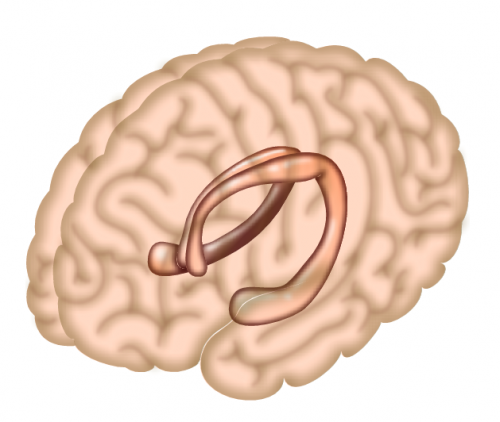October 6, 2015 report
What role does the hippocampus play in memory?

(Medical Xpress)—Meet the hippocampus: A seahorse-shaped structure in the cerebral cortex's medial temporal lobe, it's part of the limbic system, generally believed to be involved in spatial navigation and establishing long-term memories. However, it's been unclear which specific memory functions the hippocampus manages—recall, which is the ability to retrieve memory; or recognition, which is the ability to identify a stimulus as new.
Despite years of studies intended to make these neurological distinctions and identify the role of the hippocampus, it remains unclear; investigators have proposed that the hippocampus is responsible for recall, while parahippocampal structures handle recognition and discrimination activities. But a number of other studies produced evidence that the hippocampus is responsible for both activities, leaving the question unresolved. Further, none of these studies were able to establish a link between memory ability and hippocampal volume.
Now, an international group of researchers reports in the Proceedings of the National Academy of Sciences on a study of a group of patients with developmental amnesia due to severe hippocampal damage suffered early in life. Previous work by the authors determined that such damage impairs the ability to recall visual or verbal stimuli, but has no real effect on the recognition of those stimuli. By applying the Doors and People (D&P) memory measurement tool in the current study, the researchers were able to tease apart some of the ambiguities about the workload of the hippocampus in its day-to-day activity of consolidating information from short-term to long-term memories.
The D&P test was administered to 29 patients who had hippocampal damage due to hypoxic/ischemic episodes as infants or before birth. The test has four subtests, two measuring recognition and two measuring recall, both types with verbal and visual components. The researchers recorded whole-brain MRI scans for analysis of brain function during the testing phase.
Thanks to both to the large size of the cohort under study and the wide variations in the extent of hippocampal damage suffered by individuals, the researchers could examine the structure/function relationship, and they established that only recall ability is impaired in damaged hippocampi, while stimulus recognition performance was unaffected. The authors note, "[...] the visual domain may be more sensitive to hippocampal damage than the verbal domain, a conclusion in line with recent evidence in humans that the hippocampus may play a role in tasks involving difficult visual discriminations. Indeed, a deficit in discrimination rather than in recognition may be part of the explanation for the patients' difficulty with the Doors subtest, which requires processing highly detailed visual information." Additionally, the analysis revealed that recall ability deteriorates over time, though the D&P test doesn't test forgetting in recognition.
The report has implications for the understanding of hippocampal damage in early life, and reveals that hippocampal atrophy relates directly to impairments in recall memory. It also demonstrates that recall and recognition are distinct and dissociable abilities dependent upon different structures within the medial temporal lobe.
More information: "Extent of hippocampal atrophy predicts degree of deficit in recall." PNAS 2015 ; published ahead of print September 28, 2015, DOI: 10.1073/pnas.1511904112
Abstract
Which specific memory functions are dependent on the hippocampus is still debated. The availability of a large cohort of patients who had sustained relatively selective hippocampal damage early in life enabled us to determine which type of mnemonic deficit showed a correlation with extent of hippocampal injury. We assessed our patient cohort on a test that provides measures of recognition and recall that are equated for difficulty and found that the patients' performance on the recall tests correlated significantly with their hippocampal volumes, whereas their performance on the equally difficult recognition tests did not and, indeed, was largely unaffected regardless of extent of hippocampal atrophy. The results provide new evidence in favor of the view that the hippocampus is essential for recall but not for recognition.
© 2015 Medical Xpress


















